Cremation, Caste, and Cosmogony in Karmic Traditions.
Cremation, Caste, and Cosmogony in Karmic Traditions.
Cremation, Caste, and Cosmogony in Karmic Traditions.
You also want an ePaper? Increase the reach of your titles
YUMPU automatically turns print PDFs into web optimized ePapers that Google loves.
Only H<strong>in</strong>dus are cremated at the cemetery, <strong>and</strong> if there<br />
are unidentified bodies after accidents, she must confirm<br />
the religion before she starts cremat<strong>in</strong>g s<strong>in</strong>ce Muslims<br />
cannot be burned. If poor H<strong>in</strong>dus cannot afford to<br />
cremate their relative, she will recommend the<br />
<strong>Cremation</strong> Committee to buy wood for the deceased <strong>and</strong><br />
issue a death certificate, <strong>and</strong> thereafter she will cremate<br />
the dead. The Committee appo<strong>in</strong>ts the person who<br />
cremates <strong>in</strong> such cases, but <strong>in</strong> practice it is always<br />
Hazera who conducts these funerals, <strong>and</strong> she cremates<br />
whenever somebody needs her services. If there is<br />
nobody to cover the expenses, she may give the<br />
deceased a burial. Hazera has so far buried more than<br />
two hundred people with her own h<strong>and</strong>s. She knows<br />
where the old burials are located, <strong>and</strong> she tries to disturb<br />
the old ones as little as possible when new corpses are<br />
buried upon older graves.<br />
Accord<strong>in</strong>g to the <strong>Cremation</strong> Committee, there are two<br />
advantages with Hazera work<strong>in</strong>g at the Shashan; her<br />
house is close to the Shashan <strong>and</strong> she is a poor <strong>and</strong><br />
needy woman who would otherwise have been<br />
unemployed. Other H<strong>in</strong>dus reckon, acknowledge <strong>and</strong><br />
appreciate her knowledge <strong>and</strong> skills as an undertaker<br />
even though she is a Muslim. She is well known for her<br />
ritual practices, <strong>in</strong>deed some H<strong>in</strong>dus th<strong>in</strong>k she knows the<br />
rituals <strong>and</strong> the different practices better than the H<strong>in</strong>dus,<br />
<strong>and</strong> they want her to perform the death rituals. She<br />
perceives herself as a Muslim Kali devotee, <strong>and</strong> the<br />
H<strong>in</strong>dus perceive her as a Muslim but as an expert on<br />
H<strong>in</strong>du death rituals <strong>in</strong> particular, <strong>and</strong> Kali pujas <strong>in</strong><br />
general. Some of the H<strong>in</strong>dus emphasise the advantages<br />
of her be<strong>in</strong>g a Muslim because then the society might<br />
avoid similar problems as the communities have<br />
experienced <strong>in</strong> Gujarat <strong>and</strong> Allahabad where Muslims<br />
<strong>and</strong> H<strong>in</strong>dus oppose each other on religious grounds.<br />
Thus, the H<strong>in</strong>dus <strong>in</strong> general do not see it as problematic<br />
by hav<strong>in</strong>g a Muslim woman as <strong>Cremation</strong> priest or<br />
attendant, although they do not use the word “priest”.<br />
Some H<strong>in</strong>dus address her as “kaki”, mean<strong>in</strong>g aunt, <strong>and</strong><br />
call her “the aunt who knows better than us”. S<strong>in</strong>ce she<br />
has been liv<strong>in</strong>g next to the ghat for more than thirty<br />
years, followed her husb<strong>and</strong> is his work, <strong>and</strong> worked as a<br />
caretaker for almost twenty years, she has gradually<br />
learnt how to cremate by watch<strong>in</strong>g <strong>and</strong> practis<strong>in</strong>g<br />
herself. The experience she has ga<strong>in</strong>ed by observ<strong>in</strong>g <strong>and</strong><br />
participat<strong>in</strong>g <strong>in</strong> numerable cremations where the sons<br />
have conducted the rituals, has enabled her to know how<br />
the prescribed rites are to be performed. She has learnt<br />
the H<strong>in</strong>du rituals by personal experience, <strong>and</strong> now she<br />
knows more about H<strong>in</strong>du death rituals <strong>and</strong> cremations<br />
than the common H<strong>in</strong>dus do.<br />
In Sree Angam Ashram, the ma<strong>in</strong> ashram <strong>in</strong> Faridpur,<br />
they were fully aware of the fact that she conducted<br />
funerals <strong>and</strong> cremated H<strong>in</strong>dus, but H<strong>in</strong>dus are<br />
pragmatics if they have to be, <strong>and</strong> they acknowledged<br />
her skills. As they said, “<strong>in</strong> H<strong>in</strong>duism there are many<br />
thoughts <strong>and</strong> therefore many paths. The goal is the same,<br />
<strong>and</strong> as long as the m<strong>in</strong>d is pure <strong>and</strong> good, one path is as<br />
86<br />
good as another”. They knew that her m<strong>in</strong>d <strong>and</strong> spirit<br />
were good, <strong>and</strong> therefore, it did not matter that she was<br />
both a woman <strong>and</strong> a Muslim because she was devoted <strong>in</strong><br />
her duty <strong>and</strong> practice. The Brahmans too were fully<br />
aware that Hazera was work<strong>in</strong>g at the cemetery <strong>and</strong> that<br />
she was a Kali worshipper, but they had no problems<br />
with the fact that she was born as a Muslim. They<br />
believed that she had broken all relations with her family<br />
<strong>and</strong> the daily work, <strong>and</strong> only worshipped Kali. Thus,<br />
accord<strong>in</strong>g to the high religion, she belonged to Kali; she<br />
had come <strong>in</strong> touch with the sacred <strong>and</strong> div<strong>in</strong>e through<br />
Kali, <strong>and</strong> they did not see her as a Muslim anymore; for<br />
them she was a H<strong>in</strong>du.<br />
Every dead H<strong>in</strong>du <strong>in</strong> this area is carried to Ambikapur<br />
Shashan Ghat for a funeral. As <strong>in</strong>dicated, even the<br />
poorest that cannot afford their own cremations are<br />
carried to this cemetery, <strong>and</strong> Hazera will help them with<br />
the necessary wood <strong>and</strong> practical arrangements. The<br />
commoners br<strong>in</strong>g with them food <strong>and</strong> beverages, they<br />
burn <strong>and</strong> then relax <strong>in</strong> the rest house where they eat <strong>and</strong><br />
dr<strong>in</strong>k before return<strong>in</strong>g back home. The Brahmans<br />
normally use their own priests dur<strong>in</strong>g the funerals<br />
whereas the common people do not, <strong>and</strong> Hazera will<br />
supervise the descendants. If the sons cannot cremate or<br />
if there are no sons, then she performs the cremation<br />
herself on behalf of the sons. Sometimes the flesh l<strong>in</strong>gers<br />
to the bones if the cremators are unskilled, <strong>and</strong> s<strong>in</strong>ce<br />
such cremations are highly <strong>in</strong>auspicious, Hazera helps<br />
the descendants conduct<strong>in</strong>g the funeral. Moreover, she<br />
provides the funeral procession with water <strong>and</strong> tries to<br />
fulfil their dem<strong>and</strong>s <strong>and</strong> needs dur<strong>in</strong>g the funerals <strong>in</strong> the<br />
best manner. When funerals are performed dur<strong>in</strong>g night<br />
time, the relatives are afraid of enter<strong>in</strong>g the cemetery<br />
alone. They call on her, <strong>and</strong> she guides the funeral<br />
procession <strong>in</strong>to the cemetery. There are numerous evil<br />
spirits at the Shashan, <strong>and</strong> she waits at the cemetery until<br />
the cremation is completed, <strong>and</strong> then she follows the<br />
funeral procession out from the ghat. The locals <strong>in</strong> the<br />
area, both H<strong>in</strong>dus <strong>and</strong> Muslims, are afraid of the ghosts<br />
– especially dur<strong>in</strong>g night time – <strong>and</strong> nobody wants to do<br />
the work Hazera does. But, accord<strong>in</strong>g to herself, ghosts<br />
have never attacked her because Kali takes care of her<br />
children.<br />
Badol Mohanta <strong>and</strong> Doms<br />
Badol Mohanta was employed as an undertaker from the<br />
1960s <strong>and</strong> he was highly dedicated to his work. Badol<br />
Mohanta was devoted to the Shashan Ghat <strong>and</strong> to<br />
cremations, <strong>and</strong> the <strong>Cremation</strong> Committee has helped<br />
the widow after his death because she has been very<br />
poor. Badol worked day <strong>and</strong> night, <strong>and</strong> whenever they<br />
called upon him, he was available. Badol even used to<br />
carry the dead bodies himself from the hospital to the<br />
cemetery. This was a difficult job due to the stitch<strong>in</strong>g of<br />
the corpses, which could come loose. Badol Mohanta<br />
was appo<strong>in</strong>ted for the Dom job <strong>and</strong> he was responsible<br />
for the post-mortem care of the dead at the cemetery.


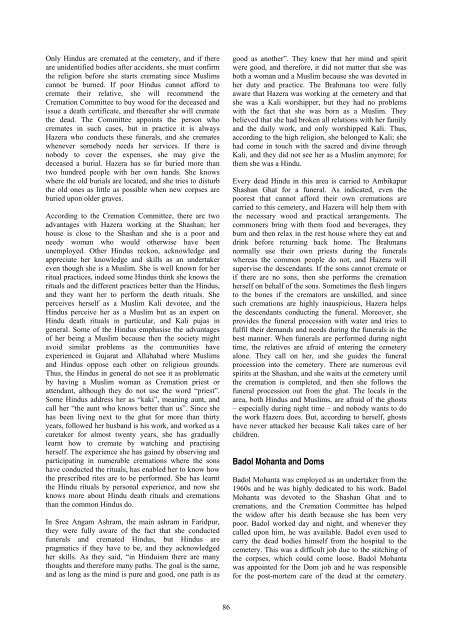
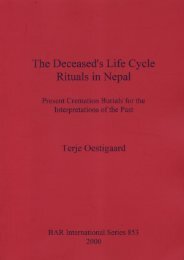


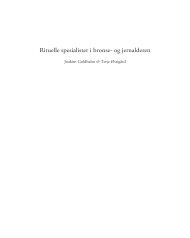
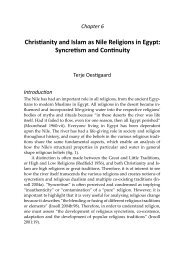
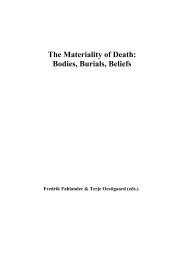


![Fullmono-AK [P2118].indd - oestigaard](https://img.yumpu.com/18994998/1/177x260/fullmono-ak-p2118indd-oestigaard.jpg?quality=85)